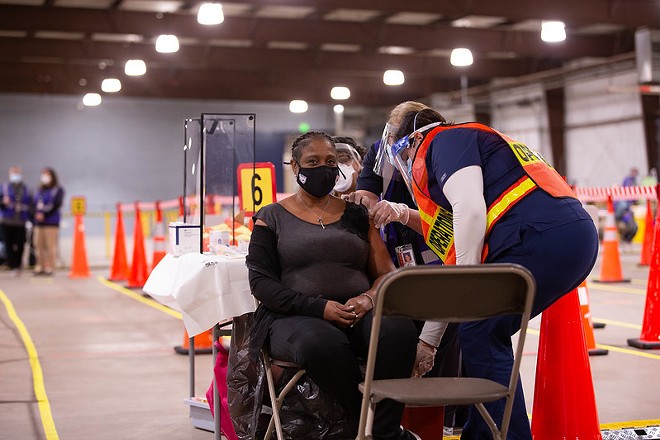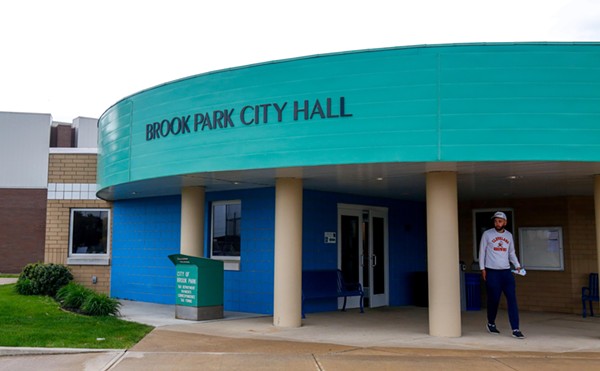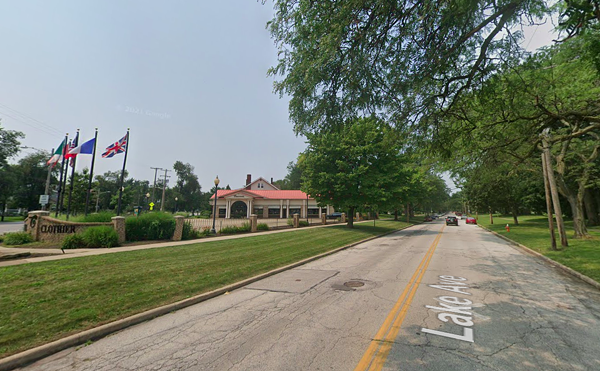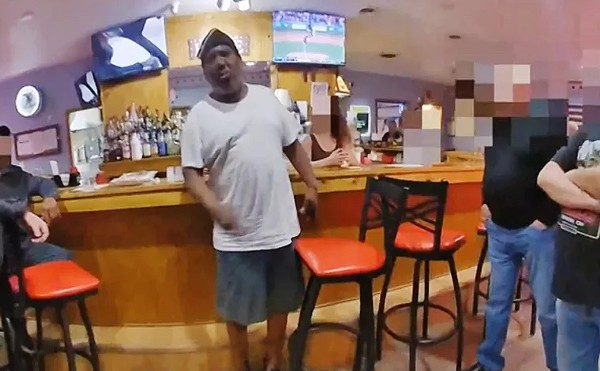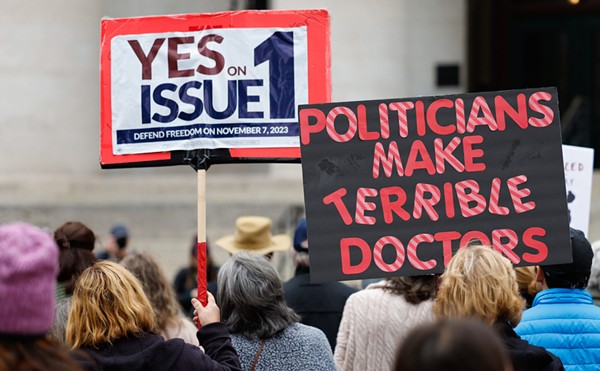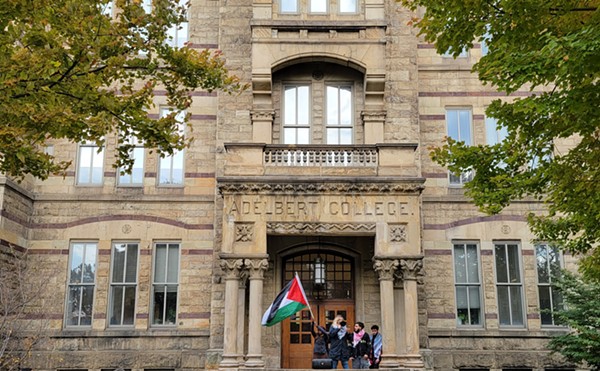As Cleveland Hospitals Get Ready to Expand Vaccine Rollout to Public, They're Still Trying to Get Full Buy-In From Own Staffers
By Vince Grzegorek on Fri, Jan 15, 2021 at 2:51 pm
[
{
"name": "Ad - NativeInline - Injected",
"component": "38482495",
"insertPoint": "3",
"requiredCountToDisplay": "5"
},{
"name": "Real 1 Player (r2) - Inline",
"component": "38482494",
"insertPoint": "2/3",
"requiredCountToDisplay": "9"
}
]
Ohio's rollout of the Covid vaccines next week enters phase 1B, which will include older residents and school personnel. Phase 1A, which includes healthcare workers and first-responders, has been ongoing since vaccines began arriving in December and continues.
The Cuyahoga County Board of Health announced this week that it would be delaying its part of phase 1B as too much work remained to be done on phase 1A.
“We’re going to hold off and in receiving the 1B vaccine until we make a bigger dent in the 1A process, but we’ll be working very closely with our providers and our partners across the community,” Director Terry Allan said, noting there are still about 10,000 first responders, developmentally disabled and assisted living residents it wanted to reach first. "We think it just makes good sense to finish the job with 1A.”
The rest of the locations that will administer vaccines in phase 1B, including select pharmacies and most hospitals, will go on, depending on supply.
Ohio Gov. Mike DeWine has bemoaned what he viewed as the state's general failure to efficiently and quickly roll out the vaccine. But the state has also left it up to localities to design and execute the process. In Cleveland, Mayor Frank Jackson this week said the reason the city had only given 1,767 of its initial allocation of 6,500 doses of the Moderna vaccine was because it lacked the proper infrastructure to do more. Nationwide, vaccinations have fallen far below promises made by the Trump administration for a variety of reasons.
As the next step begins, those administering vaccines in the second phase are battling not only infrastructure problems and a scarce supply but also a degree of public wariness over the vaccine in general.
Many in the Black community, for example, are skeptical for historical reasons — sterilization research on Black women, the Tuskegee syphilis study, etc.
More broadly, surveys have found Americans have voiced concerns about side effects, the speed of the development and approval of the vaccine, and certain conspiracy theories involving Bill Gates and anti-vax sentiments.
So far, less than half of Americans intend to get vaccinated, according to a recent survey from the Associated Press-NORC Center for Public Affairs Research.
Dr. Anthony Fauci has said that more than 80% of Americans will have to be vaccinated before the country achieves herd immunity.
As hospitals get set to begin administering vaccines to the public, they will also be part of the educational process to alleviate those fears.
It's one they've already undertaken with their own staffs.
A recent Kaiser Family Foundation survey found nearly a third of frontline workers nationwide indicated they were "vaccine hesitant," saying they "probably or definitely would not get a COVID-19 vaccine even if it were available for free and deemed safe by scientists."
In a recent briefing, Gov. DeWine said around 60% of nursing home workers in Ohio had declined to get poked.
A survey among Tampa area hospital workers found those who were hesitant had less education than those who believed the vaccines to be safe.
According to the CDC, adverse effects so far are extremely rare.
"Out of the first 1.9 million doses of Pfizer’s COVID-19 vaccine administered in the United States, there were 21 reported cases of severe allergic reactions to the vaccine, the Centers for Disease Control and Prevention said January 6," Science News reported last week.
The rate of anaphylaxis seen so far — 11.1 cases per 1 million vaccine doses — is higher than for the flu vaccine, which is 1.3 cases per 1 million doses, Nancy Messonnier, director of the CDC’s National Center for Immunization and Respiratory Diseases, said in a Jan. 6 news briefing. But the reactions to COVID-19 vaccines are “still exceedingly rare,” she said.
“These are safe and effective vaccines. We have good data to show that,” Nancy Messonnier, the director of the CDC's National Center for Immunization and Respiratory Diseases, said in a Jan. 6 briefing.
Still, Cleveland's hospital networks have seen their share of employees who have declined the vaccine.
Anecdotally, administration staff have been pleasantly surprised at the vaccine being offered to them so quickly but have felt that's partially because so many patient-forward coworkers have passed on the chance. There are stories of entire floors at hospitals where staff who've gotten the vaccine can be counted on one hand. And, if you take even a brief tour through Facebook, there are nurses sharing anti-vax memes clearly indicative of their feelings.
While some hospitals have chosen to voluntarily disclose vaccination rates, including Henry Ford in Detroit, only University Hospitals responded to a request for data from Scene with something approximating hard numbers.
"More than half of UH’s 28,000 caregivers (clinical and non-clinical) have received a COVID-19 vaccine, and through future scheduling we expect to have the majority of the remaining caregivers vaccinated by Sunday, Jan. 17," UH said in a statement. "Around 12 percent of caregivers have indicated they want to wait to receive the vaccine or do not want the vaccine. Among their reasons: 1) pregnancy or breastfeeding 2) allergies / medical conditions, 3) religious beliefs and 4) waiting to learn more information. At this time, there are no plans to make the COVID-19 vaccine mandatory for caregivers. Those who choose not to receive the vaccine can continue to work in their normal environment and will not be restricted from any area. They will be required to wear the PPE appropriate to their work environment and continue to practice good hand hygiene and physical distancing recommendations."
MetroHealth offered only a brief general statement saying that it had "offered the vaccine to the entirety of our workforce" and that it had "given doses to more than 4,700 people."
"MetroHealth’s overriding philosophy is a shot in the arm is better than a shot in the freezer," the hospital said. "We are also educating employees with in-house videos, messages from the CEO and his team and testimonials from those who have received the vaccine. The number and reasons for employees opting out is not available."
The Cleveland Clinic, meanwhile, gave the vaguest answer, despite being the largest hospital system in Cleveland.
"We have received our allocation of COVID-19 vaccine from the Ohio Department of Health and expect to receive additional shipments. Prior to receiving vaccine supplies, we surveyed our caregivers and 70% of respondents indicated that they would probably or definitely take the vaccine when it was available to them. We are currently in the process of administering vaccine to healthcare workers within our health system and have been successful in quickly filling available appointments once supply arrives. We will administer the remainder of our current supply by the end of this week."
SCENE Supporters make it possible to tell the Cleveland stories you won’t find elsewhere.
Become a supporter today.
About The Author
Vince Grzegorek
Vince Grzegorek has been with Scene since 2007 and editor-in-chief since 2012. He previously worked at Discount Drug Mart and Texas Roadhouse.
Scroll to read more Cleveland News articles
Newsletters
Join Cleveland Scene Newsletters
Subscribe now to get the latest news delivered right to your inbox.

